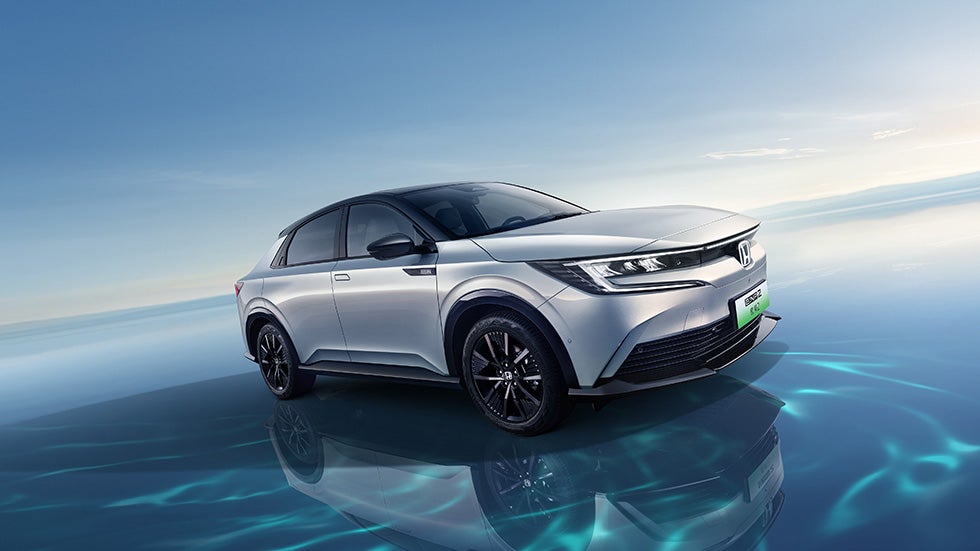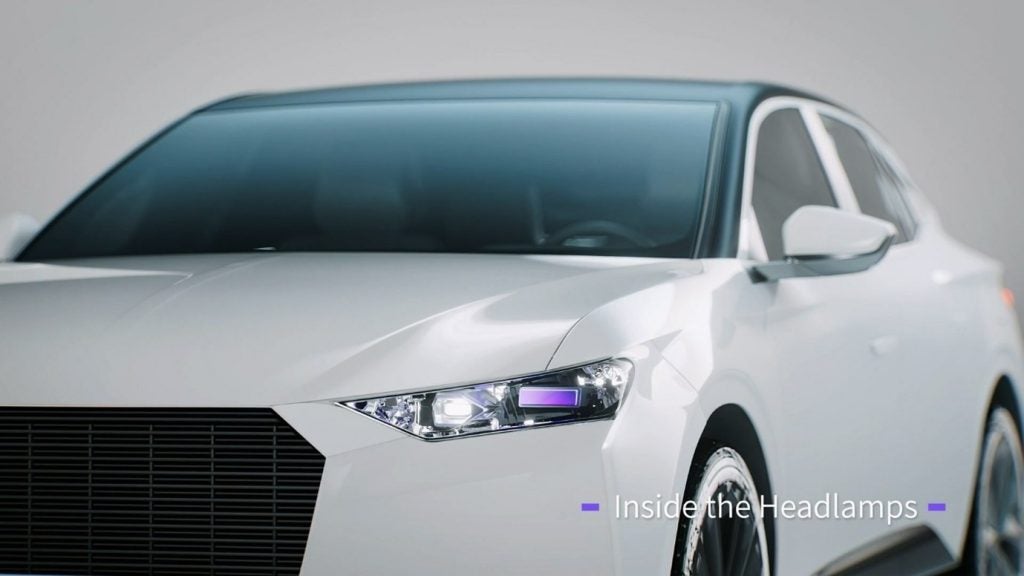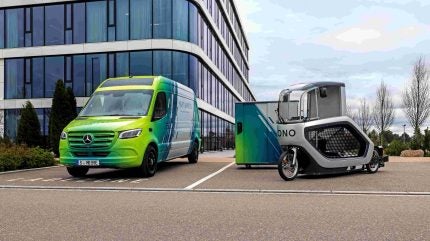
Mercedes-Benz Vans has worked with Berlin based cargo bike maker Onomotion on its Sustaineer (Sustainability Pioneer) technology demonstrator “providing an insight into what sustainability could look like in the delivery transport of the future”.
The electric van based on the already on sale eSprinter combines “a variety of innovative concepts for decarbonising the entire vehicle life cycle, reducing resource consumption, and increasing the circular economy, as well as improving the quality of life and well being of the driver”.
The ‘efficient logistics concept for last mile delivery with zero local CO₂ emissions” combines a van EV and electric bike “to create a seamless supply chain”.
The van is a ‘mobile micro depot which brings pre packaged goods in special containers to cargo bikes which then take care of the final delivery trip to the buyer’s door.
Transferring the goods to the ONO e-cargo bike takes just a few minutes, the automaker claimed, so the e-van does not have long idle times and can continue its delivery journey immediately, either to the next cargo bike or to deliver goods itself.
“Parallel delivery with cargo bikes and electric vans increases efficiency and shortens delivery times in both urban and rural areas,” Mercedes said.
How well do you really know your competitors?
Access the most comprehensive Company Profiles on the market, powered by GlobalData. Save hours of research. Gain competitive edge.

Thank you!
Your download email will arrive shortly
Not ready to buy yet? Download a free sample
We are confident about the unique quality of our Company Profiles. However, we want you to make the most beneficial decision for your business, so we offer a free sample that you can download by submitting the below form
By GlobalData“The innovative logistics concept is suitable for a wide range of industries from courier, express and parcel services to large bakeries, service providers for workwear and company textiles or food suppliers.”
Tandem use of van and cargo bike relieves traffic infrastructure and reduces delivery and waiting times.
Consignments can be pre-picked in the logistics centre according to the delivery route and loaded into the interchangeable wheeled Onomotion containers.
The special wheeled containers have two cubic metres of load volume and a maximum payload of 200kgs. They can be flexibly configured for various applications, such as parcel delivery.
The Sustaineer includes an integrated lifting arm customised for these containers, works hydraulically, has recessed rollers and can be controlled electronically via a hand held transmitter.
Two containers fit into the eSprinter configured as a long panel van with high roof and there is still enough space left for a shelving system to transport additional bulky goods. The shelving system can be accessed (even when the containers are loaded) through the right hand rear door.
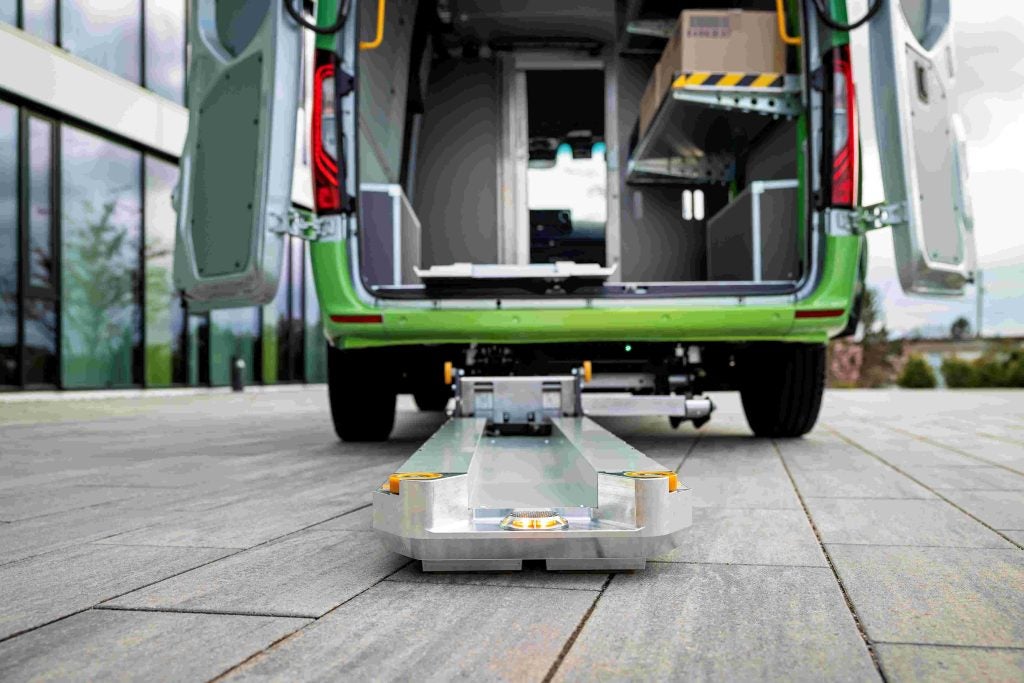
At transfer time, drivers simply roll the container onto the cargo bike’s loading area and couple it up, eliminating time-consuming reloading of individual packages.
The eSprinter consequently has significantly fewer delivery points and idle time at the kerb, known as curbside time, reducing traffic flows and relieving the burden on infrastructure especially in urban areas. The van also returns more quickly to the logistics centre and can complete more routes more quickly.
By dispensing with micro-hubs, service providers can deliver more parcels per day, shortening delivery and waiting times, and reducing costs.
“Initial [talks] with courier and parcel service providers has already begun to ensure that the individual needs of the industry are considered in further development,” Mercedes-Benz Vans said.
ONO e-cargo bike
The rider sits in a weatherproof cabin and can ride along cycle paths to any doorstep without having to look for a parking space, speeding delivery while delivery workers also have to walk less. As consignments are packed according to the delivery route, no searching or rearranging is necessary.
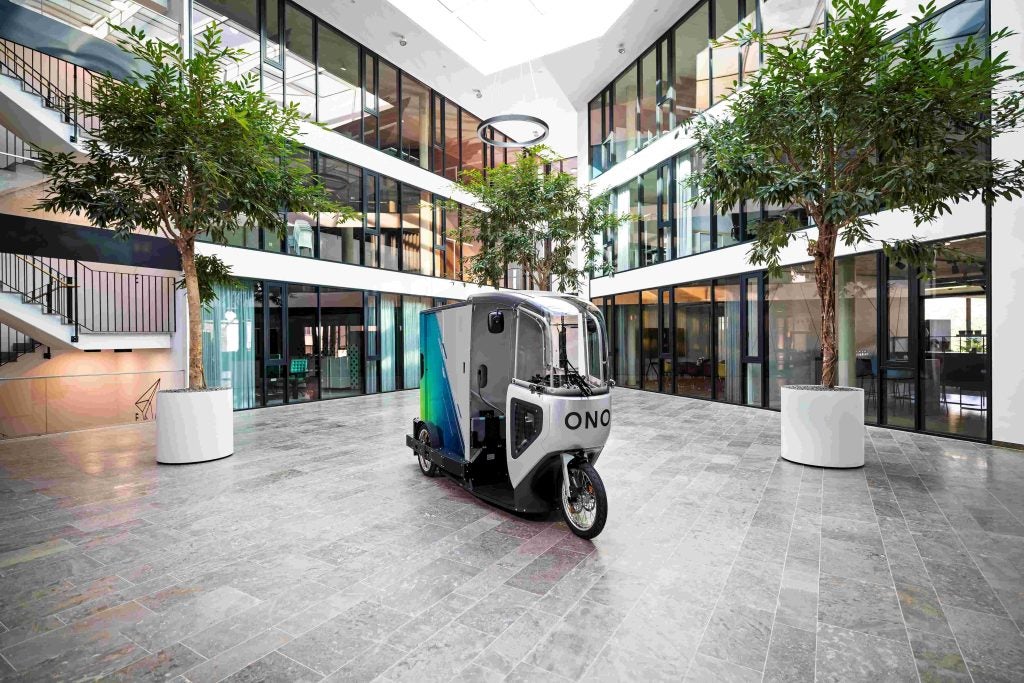
The e-cargo bike has a range of up to 25km (15 miles) and the 1.4 kWh battery offers pull-away assistance up to 6km/h (3.5mph) and “can be replaced in seconds”.
A replaceable battery on board effectively doubles the range and charging is possible via a standard earthed socket. No driving licence is required for the cargo bike which makes deployment planning more flexible and facilitates the search for new employees. The cargo bike requires significantly less space in traffic which can lead to increased acceptance of delivery transport, especially in the city.




